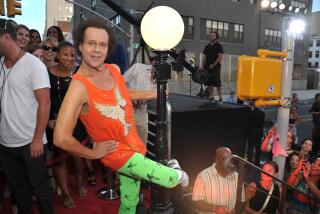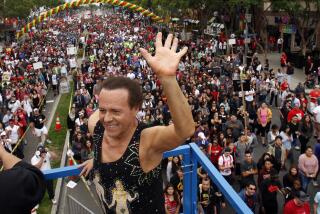James Q. Simmons III, 79; Innovator in Child Psychiatry
Dr. James Q. Simmons III, who founded a groundbreaking inpatient program for severely mentally disturbed children and adolescents at UCLAâs Neuropsychiatric Institute, died April 8 of cancer at his Encino home. He was 79.
Simmons established the instituteâs program in 1962, when child psychiatry was still a relatively new field, to provide comprehensive evaluation and treatment for children and teenagers whose mental disorders were severe enough to warrant hospitalization.
He also helped devise and promote more humane, state-of-the-art services for children who were diagnosed as mentally retarded or autistic and established one of the nationâs first interdisciplinary training programs for professionals who worked with them.
That Simmons âtook an interest in children with autism and other developmental disorders at all was quite groundbreaking,â said Dr. Bryan King, head of child psychiatry at Dartmouth Medical School and one of many of his former students who now hold prominent positions in the field. âEven now, very few child psychiatrists are identified for their interest in this. He was one of the pioneers.â
Until the 1960s, children with a wide range of developmental disabilities and behavioral problems had been largely ignored by mainstream psychiatry and ill-served by its psychoanalytic orientation.
âHe was definitely going against the grain in many respects as he worked to establish a more eclectic and medical modelâ for their treatment, said Dr. James McCracken, the UCLA instituteâs director of child and adolescent psychiatry, who also studied with Simmons.
Simmons, born in Philadelphia and raised in New Jersey, entered the Army after high school and received three battle stars during his service as a medic with the 7th Armored Division in Europe during World War II.
After his discharge in 1946, he completed a bachelorâs degree at Rutgers University and, in 1952, a medical degree at what was then called the Bowman Gray School of Medicine at Wake Forest University in North Carolina. He reentered the Army and interned at Walter Reed Army Medical Center in Washington, D.C., before moving to Brook Army Medical Center at Ft. Sam Houston, Texas, to study psychiatry.
An avid interest in children and adolescents led him to move to California and become the first child psychiatry resident at UCLA in 1955. He joined the faculty there as an assistant professor and chief of childrenâs inpatient services in 1962.
According to Dr. Fawzy I. Fawzy, the instituteâs associate director, establishing an inpatient program for children was a daunting undertaking.
Before 1962, children with severe emotional disturbances who needed hospitalization had little choice but to be treated in adult programs. Fawzy credited Simmons with recruiting and training the staff, obtaining research grants and assembling experts from many fields, including pediatrics, nutrition and social work, to treat the complex needs of the programâs young patients.
He also was a masterful clinician who participated with Dr. Ivar Lovaas in early, groundbreaking studies on new treatments for autism, a multifaceted developmental disability that typically appears during the first three years of life and impairs social interaction and communication skills.
To modify the behavior of autistic children, Simmons collaborated with Lovaas to develop an approach that favored positive reinforcement over punishment such as seclusion and restraints.
Called the âtoken economyâ approach, it provided a patient with a token good for a reward such as a romp in the park each time the patient learned to display more acceptable behavior.
This approach âwent against the central dogma of psychiatry at that time, which tragically blamed autism on disturbed parent-child interactions,â McCracken said. It instead recognized autism as a neurodevelopmental disorder.
The methods Simmons helped devise allowed more children with autism to live at home and attend school and eventually led to approaches that form what McCracken called the mainstay of behavioral treatment for autism today.
Simmons also was a leader in the California National Guard for 29 years until his retirement from the military in 1985. During that time he commanded the medical brigade, served as state surgeon and in 1982 was promoted to the rank of major general.
He also was special assistant to the surgeon general of the Army for National Guard medical readiness.
He was a recipient of the Armyâs Distinguished Service Medal.
Simmons is survived by his wife of 50 years, Beverly; four children, Jeff, Lori, Lisa and Steven; and five grandchildren.
A memorial service will be held at 2 p.m. Friday at First Presbyterian Church of Encino, 4963 Balboa Blvd., Encino.







